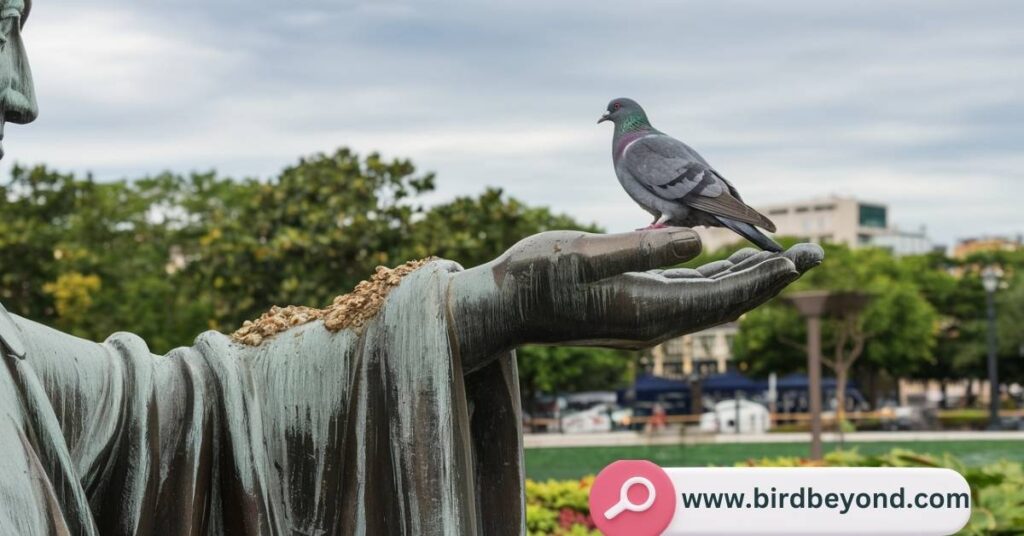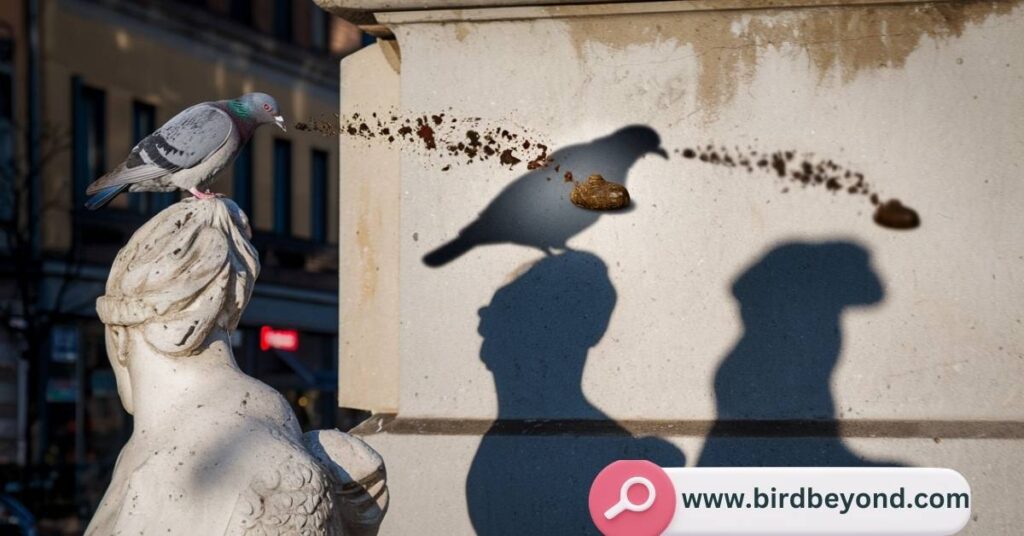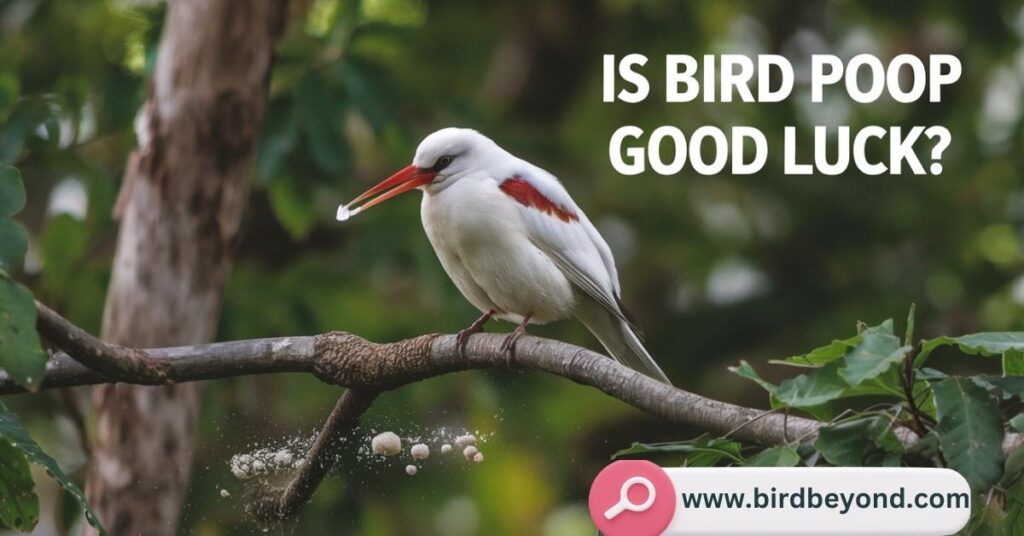Have you ever been strolling along, minding your own business, when suddenly – splat! A bird decides to use you as its personal toilet? Before you curse your misfortune, you might want to reconsider. Is there any truth to this peculiar superstition, or is it just a load of… well, you know?

In this deep dive into the world of avian excrement, we’ll explore the fascinating intersection of bird droppings and human beliefs. From ancient omens to modern-day superstitions, we’ll uncover the surprising cultural significance of these aerial “gifts” and examine whether there’s any scientific basis to the idea that bird poop brings good fortune. So, let’s spread our wings and dive into this intriguing topic!
The Unexpected Connection: Is Bird Poop Good Luck?

For centuries, humans have looked to the skies for signs and omens. It’s no wonder, then, that even their droppings have taken on mystical significance in many cultures.
The superstition that bird poop brings good luck is widespread, spanning continents and centuries. From Japan to Russia, Turkey to Italy, people have held onto the belief that a surprise splatter from above is a harbinger of good things to come. But is bird poop really good luck, or is it just a messy inconvenience?
“In many parts of the world, bird droppings on your head or shoulders are thought to be a sign of good luck, wealth, or the granting of a wish.” – Dr. Jane Goodall, renowned primatologist and anthropologist
But before we delve deeper into the cultural significance of bird poop and whether it’s truly a sign of good fortune, let’s take a moment to understand what we’re really dealing with when we talk about these avian “blessings.”
The Science Behind the Splat: What’s Really in Bird Droppings?

To truly appreciate the superstitions surrounding bird poop and whether it’s good luck, it’s essential to understand what it actually is. Unlike mammals, birds have a unique excretory system that combines solid waste and urine into a single package.
Composition of Bird Poop
Bird droppings typically consist of three main components:
- Feces: The solid waste from digested food
- Uric acid: The bird equivalent of urine, but in a white, paste-like form
- Urates: Crystallized uric acid
This unique composition is why bird poop often appears as a white and dark mixture. The white part is primarily uric acid, while the darker portion is fecal matter.
| Component | Description | Appearance |
|---|---|---|
| Feces | Solid waste from digested food | Dark colored |
| Uric acid | Bird equivalent of urine | White, paste-like |
| Urates | Crystallized uric acid | White crystals |
Why Birds Can’t Control Where They Go
Ever wondered why birds seem to have such impeccable aim when it comes to your freshly washed car? The truth is, they don’t. Birds lack the muscular control to “hold it in” like mammals can.
This lack of control is due to their unique anatomy and biology:
- Birds have a faster metabolism than mammals, processing food quickly
- They lack a urinary bladder, which means they can’t store waste
- Flying requires efficiency, so carrying extra waste isn’t ideal
Lucky or Not? Breaking Down the Bird Poop Beliefs
Now that we understand what bird poop actually is, let’s explore the various superstitions associated with these aerial deposits. Depending on where you are in the world, the interpretation of a bird poop incident can vary widely. So, is bird poop good luck? Let’s find out!
The “Direct Hit”: What It Means When a Bird Poops on You
Being the target of a bird’s bathroom break is often seen as the luckiest scenario of all. Here’s how different cultures interpret this event:
- Italy: Considered extremely lucky, especially if it happens on your head
- Russia: A sign of imminent wealth
- Turkey: Good fortune is coming your way
- India: A positive omen, particularly if it’s a crow
“In Brazil, if a bird poops on you, it’s believed you’ll come into money. The more bird poop, the more money!” – Local Brazilian saying
Home Sweet Home: Superstitions About Bird Poop on Houses
Birds have always been a part of human culture, often viewed as messengers of fate. While their songs are delightful, their droppings are less welcome. However, many cultures consider bird poop to be a sign of good luck—especially when it lands on your house! In this article, we’ll explore the different superstitions surrounding this peculiar belief and why it’s seen as a blessing in disguise.
The Superstition of Bird Poop: A Sign of Fortune
It might seem strange, but throughout history, bird poop has been seen as a symbol of wealth and prosperity. From ancient Rome to modern-day superstitions, this quirky belief has persisted across cultures. In some traditions, people believe that when a bird poops on your house, it signifies an upcoming financial windfall or positive change in your life. Moreover, the belief is that birds represent freedom and the connection between heaven and earth, making their droppings a divine gift rather than an inconvenience.
Why Do People Believe in This Superstition?
The roots of this superstition likely stem from the rarity of the event itself. Indeed, it’s not every day that a bird poops on your house. The unexpected nature of the occurrence may have led people to associate it with good fortune. Additionally, bird droppings can be considered a natural fertilizer, symbolizing growth and renewal, which could explain why some believe it to bring prosperity.
How Bird Poop Became a Global Good Luck Symbol
Birds are widely regarded as omens in many cultures. In ancient Greece, birds were believed to be messengers of the gods, and their behavior was carefully observed for signs of divine communication. Similarly, in Slavic traditions, bird droppings are thought to bring prosperity, and some people even welcome the event as a blessing from above. Therefore, the association between bird droppings and luck has taken on a life of its own, becoming a widely accepted superstition.
Should You Clean It or Leave It?
While bird poop is considered lucky, it’s important to clean it off your house for practical reasons. Bird droppings contain acidic elements that can damage the surfaces they land on, such as your roof or paint. Thus, while you may want to embrace the superstition, it’s still wise to maintain your property. Furthermore, cleaning bird droppings quickly will prevent long-term damage while still allowing you to appreciate the “luck” it supposedly brings.
“Bird droppings can cause permanent damage to your car’s paintwork if not removed promptly. The acids can eat through the clear coat and even the paint itself.” – Auto detailing expert, Mike Phillips
Embracing the Superstition: How People React to Getting “Blessed”
Despite the mess and inconvenience, many people choose to embrace the brighter side of a bird poop incident. So, what’s the deal with the superstition about bird poop being good luck?
Social Media Trends and Bird Poop Selfies
In today’s world of social media, even bird poop has found its place in the spotlight. Here are some ways people engage with the superstition online:
- Bird Poop Luck: A popular hashtag used by those sharing their “lucky” moments after being pooped on by a bird.
- Viral Challenges: Some internet trends involve intentionally trying to get pooped on to invite good luck.
- Memes and Jokes: Bird poop incidents often turn into humorous content that spreads quickly across social platforms.
Lucky Lottery Tickets and Bird Poop Connections
For some lottery players, the bird poop superstition is no joke. Here’s how some people connect it to their lottery habits:
- Buying Tickets After an Incident: Some people rush to buy lottery tickets immediately after getting pooped on, believing that luck is on their side.
- “Lucky” Numbers: Others use the date or time of the bird poop incident to choose their lottery numbers.
- Anecdotal Evidence: Stories of lottery wins following bird poop encounters circulate widely, further fueling the superstition.
Cultural Celebrations and Rituals Involving Bird Droppings
In various parts of the world, bird droppings have made their way into cultural traditions and rituals:
- Fertility Rituals: In certain regions of India, bird droppings are believed to boost fertility, and their occurrence is welcomed as a sign of future blessings.
- New Year Celebrations: Some cultures see bird poop as a positive omen for the coming year, symbolizing new beginnings and prosperity.
- Wedding Traditions: In some cultures, bird droppings on a bride’s dress are interpreted as a sign of a fruitful and prosperous marriage.
Beyond Luck: The Ecological Importance of Bird Droppings
While we’ve explored the cultural significance of bird poop and whether it’s considered good luck, it’s equally important to recognize its ecological value:
Seed Dispersal and Plant Growth
Birds play a crucial role in the dispersal of plant seeds, and their droppings contribute to plant growth in several ways:
- Many seeds pass through birds’ digestive systems unharmed, and when deposited in new locations, they help to propagate various plant species.
- Bird droppings act as natural fertilizer, providing essential nutrients to the seeds they carry, aiding biodiversity and plant population health.
Nutrient Cycling in Ecosystems
Bird droppings also contribute significantly to the cycling of nutrients in ecosystems:
- Nitrogen: Bird poop is rich in nitrogen, which is essential for plant growth and development.
- Phosphorus: Another crucial nutrient, phosphorus, found in bird droppings, also supports healthy plant growth.
- Marine Ecosystems: Seabird droppings transfer nutrients from the sea to the land, enriching coastal and island ecosystems.
Guano: A Valuable Resource
In large quantities, bird droppings—also known as guano—are a prized resource:
- Fertilizer: Guano has long been valued as an excellent natural fertilizer, rich in nutrients vital for agriculture.
- Historical Importance: Guano was so valuable in the past that conflicts were fought over control of guano-rich islands.
- Modern Uses: Even today, guano is used in organic farming and as a sustainable fertilizer option, appreciated for its environmental benefits.
Conclusion: Is Bird Poop Good Luck After All?
As we’ve seen, the superstition of bird poop bringing good luck is a complex blend of cultural beliefs, psychological factors, and a little bit of wishful thinking. While there’s no scientific proof that bird droppings can actually bring good fortune, the belief itself can have positive effects on those who embrace it:
- Positive Thinking: Choosing to view a potentially unpleasant event as lucky can improve your mood and overall outlook on life.
- Cultural Connection: Superstitions like these foster a sense of shared cultural heritage and community.
- Conversation Starter: Let’s face it, a bird poop story is always good for a laugh and makes for an interesting topic at parties!
So, is bird poop good luck? The answer, much like the superstition itself, depends on your perspective. While there’s no concrete evidence to support the claim, the belief can inspire positivity, connection, and even laughter.
FAQs
Why is bird poop considered good luck?
In many cultures, bird droppings are thought to bring good luck, wealth, or even grant wishes. Countries like Russia, Italy, Turkey, and Japan all view an unexpected bird poop incident as a positive omen.
What do bird droppings symbolize in different cultures?
The interpretation of bird poop varies worldwide. In Italy, having bird droppings land on your head is seen as extremely lucky, while in Russia, it’s linked to the promise of wealth.
Are there health risks associated with bird droppings?
Yes, bird droppings can carry diseases like histoplasmosis, cryptococcosis, and salmonella. It’s essential to clean up bird poop promptly and wash thoroughly after any contact to avoid potential health risks.
What role do bird droppings play in nature?
Bird droppings play a critical role in seed dispersal and nutrient cycling. They help maintain biodiversity by spreading plant seeds and providing natural fertilizer. In marine ecosystems, seabird droppings transfer vital nutrients from the sea to the land.
How can bird poop damage property?
Bird droppings contain acids that can erode surfaces like buildings and car paint over time. If left uncleaned, they can cause significant damage to stone, metal, and car finishes, as well as create hazardous, slippery surfaces.
Related Posts You Might Like:
- Four-Letter Bird Names
- Blue Jay Behavior
- Are Blue Jays Good Luck?
- Six Letter Bird Names
- Do Peacocks Mate for Life?
- Mockingbird Symbolism

William Henry is a distinguished blogger with a flair for avian storytelling. With a wealth of experience, he delivers captivating insights and expert knowledge to Bird Beyond. William’s passion for birds and his engaging writing style make him a standout voice in the birdwatching community, offering readers both valuable information and delightful narratives.







